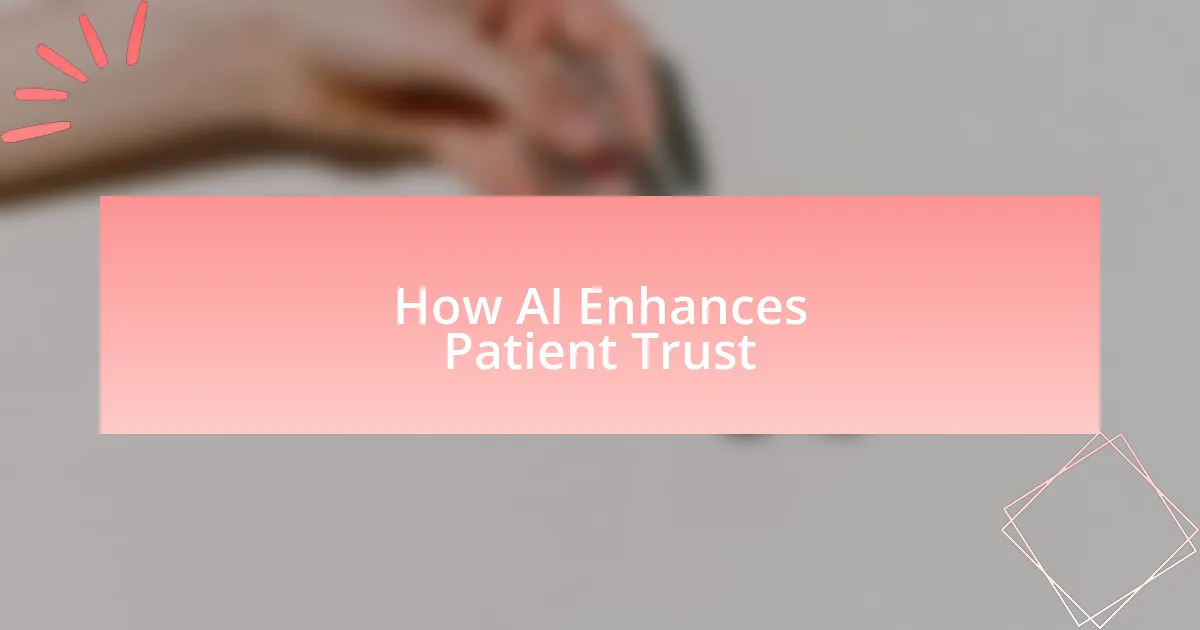Key takeaways:
- AI in healthcare enhances diagnostics and personalized medicine, improving patient outcomes through data analysis and tailored treatments.
- Trust is essential in healthcare; it encourages open communication, adherence to treatment plans, and collaboration between patients and providers.
- Transparency in AI decision-making can bolster patient trust, as understanding how AI contributes to care helps alleviate concerns.
- Challenges to trust include skepticism about AI accuracy, data privacy issues, and the need for clear communication of AI processes to patients.

Definition of AI in Healthcare
Artificial Intelligence (AI) in healthcare refers to the use of algorithms and software to mimic human cognition in the analysis of complex medical data. It encompasses a broad range of technologies, including machine learning, natural language processing, and robotics. Reflecting on my encounters with AI in medical settings, I’ve often wondered how much more efficient diagnostics can become as these technologies evolve.
When I consider AI’s ability to analyze vast amounts of patient data to identify patterns, it’s clear that this technology can enhance decision-making and improve patient outcomes. For instance, I vividly recall a time when a predictive analytics tool helped clinicians spot early signs of sepsis in a patient who would have otherwise gone unnoticed. Isn’t it thrilling to think about the potential for AI to save lives through faster and more accurate diagnoses?
Additionally, AI can support personalized medicine by tailoring treatments to individual patients based on their specific genetic makeup and health histories. This feels like a significant leap toward understanding the nuances of patient care. Who wouldn’t want a treatment plan optimized just for them? As we embrace AI’s capabilities, it’s crucial to consider how these innovations can cultivate greater trust between healthcare providers and patients.

Importance of Trust in Healthcare
In my experience, trust is the cornerstone of an effective healthcare system. When patients trust their providers, they are more likely to share critical information that influences their treatment outcomes. I remember a conversation with a friend who hesitated to discuss her symptoms out of fear of judgment; it was only when she felt reassured that her doctor genuinely cared that she opened up. This highlights how essential trust is for fostering honest communication.
Moreover, trust creates a partnership between patients and providers, which can significantly enhance treatment adherence. I’ve seen firsthand how patients who believe in their healthcare team’s expertise are more likely to follow treatment plans, ask questions, and express concerns openly. It’s a vital dynamic that can encourage proactive health management. Doesn’t it make sense that when patients feel supported, they are more empowered to take part in their own care?
In the face of emerging technologies like AI, building and maintaining trust becomes even more crucial. Patients may feel uncertain about how AI influences their care, and it’s our responsibility as healthcare professionals to address these concerns transparently. I’ve found that engaging in open discussions about AI’s role—instead of glossing over its complexities—can help demystify the technology and reinforce trust. After all, isn’t patient trust the foundation for embracing innovation in healthcare?

How AI Enhances Patient Trust
AI has the potential to significantly enhance patient trust by ensuring transparency in decision-making. For instance, I recall a time when a patient expressed concern about a treatment recommendation driven by AI algorithms. By taking the time to explain the data sources and the reasoning behind the AI’s suggestions, I could see her anxiety fade. It was a reminder that when patients are informed about how technology contributes to their care, they are more likely to feel secure and confident in their treatment paths.
Moreover, AI can personalize healthcare experiences, leading to stronger connections between patients and providers. I have witnessed this firsthand when a health system employed AI to tailor communication and follow-ups based on individual patient needs. Patients felt seen and valued, which transformed their interactions with healthcare. Isn’t it fascinating how a simple increase in personalized communication can make someone feel like their well-being is genuinely prioritized?
Finally, AI’s ability to predict health outcomes through data analysis can empower patients with knowledge. I remember when a predictive analytics tool helped identify a potential health risk for a patient, allowing for preemptive action. When patients realize that AI is not just a tool but a partner in their health journey, their trust in the system deepens. It’s amazing how technology can bridge the gap between patients and providers, fostering a collaborative spirit that ultimately leads to better health outcomes.

Challenges to Trust in AI
Navigating the complexities of trust in AI within healthcare is certainly challenging. One instance stands out to me when I was discussing AI diagnostic tools with a group of healthcare professionals. It struck me how some colleagues remained skeptical about AI’s accuracy, fearing it might overshadow their expertise. It made me wonder: can we (and should we) expect technology to earn trust in the same way a human provider does? Without addressing these concerns head-on, the adoption of AI might struggle to gain traction.
Data privacy is another hurdle that looms large. I recall a patient voicing her apprehension about sharing her health data with AI systems, fearing misuse or breaches. I completely understand her perspective—personal health information is sensitive. This raises an important question: how can we reassure patients that their data is safe while still leveraging AI’s capabilities? Building robust security measures and transparent policies is crucial if we hope to bridge this trust gap.
Lastly, the opacity of AI decision-making processes presents a significant barrier. A friend once shared his unease after receiving an AI-generated recommendation for treatment, but without any clear explanation of how that conclusion was reached, he felt disoriented. It led me to ponder how we can better communicate AI processes to demystify these technologies for patients. If we want to foster trust, transparency isn’t just beneficial; it’s essential.

Personal Insights on Building Trust
Building trust in AI within healthcare requires genuine connection. I remember a time when I volunteered at a health fair, where I met a mother who was apprehensive about using AI for her child’s health. She asked me, “How can I trust that a machine knows what my child needs?” It struck me how vital it is for us to listen to these concerns and respond with empathy. Engaging in open conversations can create a bridge where technology feels less intimidating and more like a helpful partner in care.
During a recent discussion with a team of data scientists, I learned about their rigorous testing protocols for AI algorithms. They shared a story about how, after a minor error was caught, they promptly communicated the issue to both healthcare providers and patients affected. This level of transparency not only built trust with the stakeholders involved but also reinforced my belief that accountability is key. How often do we see such honesty in healthcare? It’s imperative that we prioritize transparency to cultivate an environment of trust.
I often think about the power of shared experiences in fostering trust. Recently, a close friend confided in me how a particularly negative encounter with an AI system made her hesitant to engage with digital health tools again. It reminded me how vital it is to create a community where patients can share their stories and learn from one another. Can we leverage these shared experiences to enhance patient confidence in AI? By nurturing an open dialogue about the benefits and hurdles of AI, we can collectively pave the way for a more trusting future.